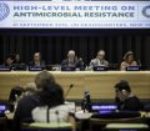Social Watch E-Newsletter - Issue 276 - September 30, 2016
Published on Fri, 2016-09-30 22:10
 |
| Issue 276 - September 30, 2016 |
|
|
| |
Check out new web feature
"Global Policy Watch Notice Board" for updates on current affairs of the United Nations in New York
|
| |
|
| |
Morocco: Challenges of inclusiveness and participation
|
| |
|
| |

Photo: UNDG
|
During the last few years Morocco has adopted some public policies that might help meet the 2030 Agenda objectives, but many challenges have to be confronted in order to ensure to proper and effective progress towards sustainable development.
The 2030 Agenda, negotiated by Member States, lays out goals and targets at the global level. Like other countries, Morocco needs to translate these into the national context, with a strategy designed to achieve local priorities. Efforts to achieve the SDGs may be hampered by the government’s persistence in carrying out neoliberal policies (privatization of public services such as education and health for example, austerity and public spending cuts) as part of its commitments to the International Monetary Fund. Similarly, monitoring and evaluating the action plans set out for delivery of the 2030 Agenda is crucial in achieving successes. Unfortunately, this practice is still uncommon in Morocco. Only a hundred of participants from civil society took part in the national consultation, which lasted no more than one day. Given the number of CSOs in Morocco (about 90,000), the consultation process is far from being inclusive and participatory. Read more
|
| |
|
| |
Forty Social Watch coalitions around the world are contributing their assessments and reports to the global Social Watch report 2016, under the overall theme Goals for 2030... and obstacles to getting there. The Social Watch network contributes these analysis to the current global discussions around implementation of the 2030 Agenda, which just will not happen without civil society independent monitoring.
The Social Watch national platforms are independent coalitions of civil society organizations struggling for social and gender justice in their own countries. The Social Watch network has been publishing since 1996 yearly reports on how governments implement their international commitments to eradicate poverty and achieve equality between women and men.
|
| |
|
| |
|
| |

Photo: UN
|
It may sound like an issue for health specialists, but at the UN high-level meeting on antimicrobial resistance (AMR) ministers and heads of state from around the world made clear that it is more than that it appears.
This is the fourth time that the UN General Assembly has addressed health issues. As the representative of Portugal pointed out, this meeting “is proof of global recognition of this problem and how important an issue it is”. Executive Director of South Centre, Martin Khor said that AMR is “as serious as Climate Change and perhaps more immediate”. Read more
|
|
| |
|
| |
|
| |
It's had a very useful if sometimes controversial past and it will have great relevance for many more years ahead.
That's the sense one has about the Declaration on the Right to Development as it is commemorated 30 years after its adoption by the United Nations General Assembly in 1986.
Three decades ago, the Declaration "broke new ground in the struggle for greater freedom, equality and justice," remarked the UN High Commissioner for Human Rights, Zeid Ra'ad Al Hussein, at a session of the Human Rights Council on 15 June, celebrating the 30th anniversary of the Declaration.Read more
|
|
| |
|
| |
|
| |
Several least-developed countries - Benin, Tanzania, and Cambodia among others - voiced their concern at the World Trade Organization on 22 September over the lack of progress in addressing their core issues such as the simplification of preferential rules of origin as promised in the Nairobi ministerial declaration (NMD), several participants told the SUNS.
During a meeting of the WTO's Committee on Rules of Origin (CRO), the LDCs reminded the preference- granting developed countries as well as the developing countries declaring themselves in a position to do so to notify the measures they are required to undertake for simplifying the preferential rules of origin under the Nairobi ministerial declaration of December 2015. Read more
|
|
| |
|
|
|
| |
|
SOCIAL WATCH IS AN INTERNATIONAL NGO WATCHDOG NETWORK MONITORING POVERTY ERADICATION AND GENDER EQUALITY Social Watch >>
Social Watch E-Newsletter For comments, sugestions, collaborations contact us at: socwatch@socialwatch.orgTo stop receiving this newsletter send a message with the subject "unsubscribe" to: socwatch@socialwatch.org |
|
|
|
SUSCRIBE TO OUR NEWSLETTER
Submit
|
